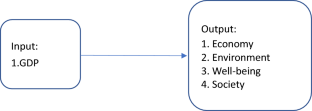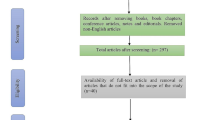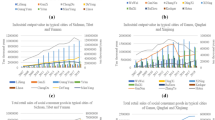Abstract
Economic progress has pushed human beings to pay greater attention on their happiness, and various indicators to measure it have been created with the OECD’s Better Life Index one of the most famous. This research uses the entropy method to divide the original 20 items of the Better Life Index into four categories (economic, environmental, social, and well-being). The Sustainable Development Goals promoted by the United Nations in recent years also include the same four aspects. Therefore, this study evaluates the efficiency performance of the 34 OECD member countries under these factors from 2013 to 2017 and analyzes their residents’ happiness and sustainable development. The findings are as follows. (1) The overall efficiency of Australia, Belgium, Iceland, Luxembourg, New Zealand, Switzerland, and United States is good, and their people’s happiness is high. (2) Estonia, Greece, Hungary, Mexico, Slovak Republic, and Turkey exhibit poor economic efficiency. (3) Chile, Greece, Israel, Mexico, and Turkey present poor environmental efficiency. (4) Mexico has poor social index efficiency. (4) The well-being efficiency of Estonia, Hungary, and Turkey is poor. (5) Lastly, 17 out of 34 countries have good sustainable development.






Similar content being viewed by others
Data availability
Not applicable.
References
Banker, R. D., Charnes, A., & Cooper, W. W. (1984). Some models for estimating technical and scale inefficiencies in data envelopment analysis. Management Science, 30(9), 1078.
Bernini, C., Guizzardi, A., & Angelini, G. (2018). DEA-like model and common weights approach for the construction of a subjective community well-being indicator. Social Indicators Research, 114, 405–424.
Bernoulli, Daniel, (1738) [1954], Specimen Theoriae Novae de Mensura Sortis, Commentarii Academiae Scientiarum Imperialis Petropolitanae, 5, 175–192. English translation, 1954, “Exposition of a New Theory on the Measurement of Risk”, Econometrica, 22(1): 23–36. https://doi.org/10.2307/1909829.
Bonasia, M., Simone, E., D'Uva a, M., Napolitano, O. (2022). Environmental protection and happiness: A long-run relationship in Europe. Environmental Impact Assessment Review, 93, 106704.
Cheng, Y., Zhang, J., Wei, W., & Zhao, B. (2021). Effects of urban parks on residents’ expressed happiness before and during the COVID-19 pandemic. Landscape and Urban Planning, 212, 104118.
Chiu, Y. H., Huang, K. Y., Chang, T. H., & Lin, T. Y. (2021). Efficiency assessment of coal mine use and land restoration: Considering climate change and income differences. Resources Policy, 73, 102130.
Chung, Y. H., Färe, R., & Grosskopf, S. (1997). Productivity and undesirable outputs: A directional distance function approach. Journal of Environmental Management, 51, 229–240.
Cui, Y., Feng, P., **, J., & Liu, L. (2018). Water resources carrying capacity evaluation and diagnosis based on set pair analysis and improved the entropy weight method. Entropy, 20, 359.
Cui, X., Zhao, T., & Wang, J. (2021). Allocation of carbon emission quotas in China’s provincial power sector based on entropy method and ZSG-DEA. Journal of Cleaner Production, 284, 124683.
Diener, E., Scollon, C. K. N., Oishi, S., Dzokoto, V., Suh, E. M. (2000). Positivity and the construction of life satisfaction judgments: Global happiness is not the sum of its parts. Journal of Happiness Studies, 1, 159–176.
Easterlin, R. (1974). Does economic growth improve the human lot? Some empirical evidence (PDF). In P. A. David & M. W. Reder (Eds.), Nations and households in economic growth essays in Honor of Moses Abramovitz. Academic Press, Inc.
Farrell, M. J. (1957). The measurement of productive efficiency. Journal of the Royal Statistical Social: Series A (general), 120(3), 253–281.
Ferraz, D., Moralles, H., Campoli, J., Oliveira, F., & Rebelatto, D. (2018). Economic complexity and human development: DEA performance measurement in Asia and Latin America. Gest. Prod. São Carlos, 25, 839–853.
Han, W., & Hart, J. (2022). Precarious parental employment, economic hardship, and parenting and child happiness amidst a pandemic. Children and Youth Services, 133, 106343.
Hicks, J. (1946). Value and capital (2nd ed.). Clarendon Press.
Hu, J.L., Wang, S.C. (2006). Total-factor energy efficiency of regions in China. Energy Policy, 34, 3206–3217.
**, Z., Zeng, S., Cao, C., Ma, H., & Sun, D. (2020). Impacts of pollution abatement projects on happiness: An exploratory study in China. Journal of Cleaner Production, 274, 122869.
Li, Y., Zhang, Q., Wang, L., & Liang, L. (2020). Regional environmental efficiency in China: An empirical analysis based on entropy weight method and non-parametric models. Journal of Cleaner Production, 276, 124147.
Li, Y., Lin, T. Y., Chiu, Y. H., Cen, H., & Lin, Y. N. (2021). Efficiency assessment of coal energy and non-coal energy under bound dynamic DDF DEA. Environmental Science and Pollution Research, 28, 20093–20110.
Lozano, M., & Solé-Auró, A. (2021). Happiness and life expectancy by main occupational position among older workers: Who will live longer and happy? SSM - Population Health, 13, 100735.
Ma, Y., & Chen, D. (2020). Openness, rural-urban inequality, and happiness in China. Economic Systems, 44, 100834.
McNally, M. (1980). Consumption, utility, and social process. Journal of Post Keynesian Economics, 2, 381–391.
Mignamissi, D., & Kuete, Y. (2021). Resource rents and happiness on a global perspective: The resource curse revisited. Resources Policy, 71, 101994.
Morris, R., Kettlewell, N., & Glozier, R. (2021). The increasing cost of happiness. SSM - Population Health, 16, 100949.
Mouratidis, K., & Yiannakou, A. (2022). What makes cities livable? Determinants of neighborhood satisfaction and neighborhood happiness in different contexts. Land Use Policy, 112, 105855.
Nemati, S., & Maralani, F. (2016). The relationship between life satisfaction and happiness: The mediating role of resiliency. International Journal of Psychological Studies, 8, 194–201.
Nguyen, B., & Le, V. (2021). The relationship between global wealth and happiness: An analytical study of returns and volatility spillovers. Borsa Istanbul Review, 21, S80–S89.
Nissi, E., Sarra, A. (2016). A measure of well-being across the italian urban areas: An integrated dea-entropy approach. Social Indicators Research, 136, 1183–1209.
Sanduijav, C., Ferreira, S., Filipski, M., & Hashida, Y. (2021). Air pollution and happiness: Evidence from the coldest capital in the world. Ecological Economics, 187, 107085.
Scoffham, S., & Barnes, J. (2011). Happiness matters: Towards a pedagogy of happiness and well-being. The Curriculum Journal, 22, 535–548.
Susniene, D., & Jurkauskas, A. (2009). The concepts of quality of life and happiness: Correlation and differences. Inzinerine Ekonomika-Engineering Economics, 3, 58–66.
Terziev, V. (2019). Social efficiency as a measure of social activities. SSRN Electronic Journal, 5, 656–662.
Tobgye, S., Kinley, & Dorji, S. (2022). Digital transformation, happiness, and well-being. Encyclopedia of Violence, Peace, & Conflict, 4, 209-216.
Veenhoven, R. (1984). Conditions of happiness. Springer. https://doi.org/10.1007/978-94-009-6432-7
Veenhoven, R. (2000). The four qualities of life ordering concepts and measures of the good life. Journal of Happiness Studies, 1, 1–39.
Wang, J., & **e, Y. (2015). Feeling good about the iron rice bowl: Economic sector and happiness in post-reform urban China. Social Science Research, 53, 203–217.
Wang, J., Wan, Y., Sun, C., & Chen, X. (2021a). Does mandatory air quality information disclosure raise happiness? Evidence from China. Energy Economics, 94, 105094.
Wang, J., Wang, C., Li, S., & Luo, Z. (2021b). Measurement of relative well-being poverty and its impact on happiness in China: Evidence from CGSS. China Economic Review, 69, 101687.
Author information
Authors and Affiliations
Corresponding author
Ethics declarations
Conflict of interest
The authors declare no conflict of interest.
Ethical Approval
Not applicable.
Informed Consent
Not applicable.
Consent to Participate
Not applicable.
Consent to Publish
Not applicable.
Additional information
Publisher's Note
Springer Nature remains neutral with regard to jurisdictional claims in published maps and institutional affiliations.
Rights and permissions
Springer Nature or its licensor (e.g. a society or other partner) holds exclusive rights to this article under a publishing agreement with the author(s) or other rightsholder(s); author self-archiving of the accepted manuscript version of this article is solely governed by the terms of such publishing agreement and applicable law.
About this article
Cite this article
Lin, TY., Chiu, Yh., **e, X.H. et al. Economic Performance, Happiness, and Sustainable Development in OECD Countries. Soc Indic Res 171, 159–188 (2024). https://doi.org/10.1007/s11205-023-03253-z
Accepted:
Published:
Issue Date:
DOI: https://doi.org/10.1007/s11205-023-03253-z




